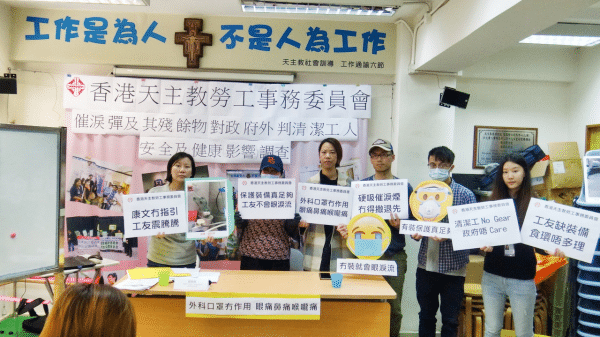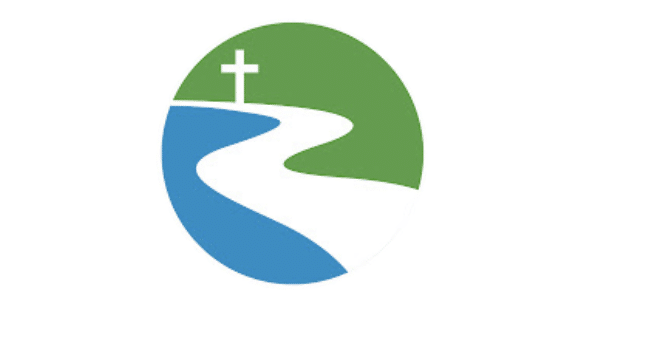
HONG KONG (SE): The Catholic Commission for Labour Affairs pointed out in a survey that the majority of street cleaners in Hong Kong were not trained or equipped to clear up tear gas residue from clashes between anti-goverment protesters and police.
During a press conference on January 16, the commission pointed out that around 65 per cent of the cleaners who took part in the cleaning up of tear gas residue said they felt unwell after the tasks. Over half of them suffered from throat dryness (57.1 per cent), continuous coughing (54.3 per cent) and persistent tearing (54.3 per cent). Some of them experienced difficulty in breathing, eyes infection and other symptoms like vomiting and diarrhea.
The commission interviewed a total of 88 outsourced street cleaners from the end of November to December. Over 50 of them said they worked in areas affected by tear gas, such as parks and playgrounds in Sai Wan Ho, Wan Chai, Tsim Sha Tsui, Mongkok and Yau Ma Tei.
Over 85 per cent of the cleaners surveyed said they were not given any guidance on how to clean the residue properly. Only a few of them said they were given brief instructions.
The survey also found that the protection given to the cleaners is obviously lacking. Most of the respondents were only given surgical masks and rubber gloves. Only around 10 per cent were given boots and aprons. Less than ten per cent were given goggles, N95 masks and protective clothing.
Nearly 30 per cent of the cleaners said they encountered tear gas directly while working in a protest area. However, over half of the total respondents said their employers did not tell them that they could leave the scene when they expected the firing of tear gas.
A worker, who is over 60-years-old and assigned to work along Nathan Road on the night shift, said she was often trapped in an area where tear gas was fired. She experienced serious irritation in the eyes and blurred vision. She once feared that she would lost her eyesight.
She said the situation on Nathan Road was often dangerous and she was really frightened but she could not leave her work unless she received instructions from her employer.
She said the contractor did not give her additional equipment during the period of social unrest and was only given surgical masks as usual. Her superiors never tell her what to look for while cleaning away the residue of tear gas.
She recalled that the Leisure and Cultural Services Department sometimes issued notices for worker to leave work when there was serious confrontation between protestors and the police. However, these often came too late as MTR stations would already closed and the roads in chaos. She went home with a lot of difficulties.
Another outsourced worker under the Leisure and Cultural Services Department shared that she encountered tear gas once while working in a park near Dundas Street in Mongkok and she immediately escaped to a more closed area in the park. She said she kept sneezing, coughing and tearing.
She said it was not until a labour group visited them later that she knew that she had to put on a protective face mask in areas hit by tear gas. She was told that for eye irritations, she should wash the chemical from them with large amount of saline solution. She should also wear long pants and a long sleeve top to protect her arms and legs, and the polluted clothing should not be brought home. She said her employee never gave her such reminders.
The commission said contractors should make a safety assessment when their workers are required to clean the tear gas residue in streets, playgrounds as well as government facilities. They are also urged to provide sufficient personal protection equipment for the cleaners.
It also pointed out that the government should require the contractors to explain to frontline workers the procedures about how to clean tear gas residue properly to increase their safety awareness. In areas seriously polluted by tear gas residue, the government should send professional cleaners to do the cleaning with full gear. The government should also allow cleaners to leave their work in a protest area when they believe their personal safety is endangered without deducting their salary.
According to a report by RTHK, Health secretary, Sophia Chan Siu-chee, said in October that the Food and Environmental Hygiene Department had issued guidelines for workers who clean up streets where tear gas has been fired, telling them what kind of safety gear they should use and these guidelines had been made available to outsourced workers.
However, Law Pui-shan, the policy research officer of the Labour Commission, said during the press conference that the government must start enforcing the guidelines as the survey showed that most contractors did not follow them.













